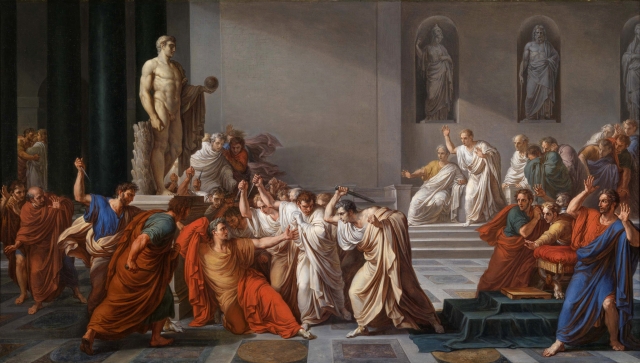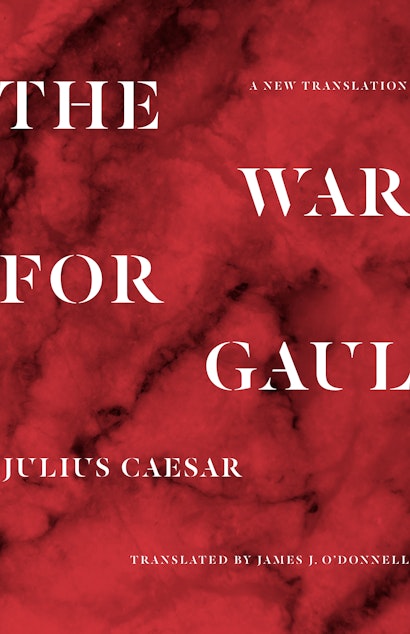Imagine a rogue general, assigned only to guard the frontiers of his country’s remote provinces – but the authorities back in the capital tacitly approve of some adventurism. He goes on a rampage through neighboring territories, allying himself with certain ethnic groups in the region against others, gradually playing them off against each other and delivering to the politicians back home a de facto expansion of their empire and of the wealth they can draw upon. In the process, he himself makes an absolute pile of money to advance his own career and builds up a reputation as the invincible future leader of his nation. What do you think of him?
I’m not asking if you would approve a drone strike to take him out, if for no other reason than that they didn’t have precision guided weapons of that kind in the first century BCE. The rogue general I’m thinking about is Julius Caesar and though it took them a few more years of civil war, his colleagues did finally decide that twenty-three stab wounds administered at the base of the statue of his most hated rival Pompey was more their style.
But “here was a Caesar! when comes such another?” For his charisma, his courage, his brilliance, and not least for his literary pizzazz, Julius Caesar is a great man of history, is he not? As assassinated generalissimos go, his spin doctors over the two thousand years since have done an amazing job of burnishing his reputation and keeping his name before the public. (Good move, no question, getting the Russians to call their rulers “czars” and the German nations to call them “Kaisers”: people nowadays pay serious money for that kind of branding success.)
So what do you think of him? I’ve just published a new translation of his account of his wars in Gaul, which I think is the very best book ever written by a very bad man setting out to tell us exactly how bad he was, with absolutely no inkling of conscience or embarrassment. It’s a gorgeous book (well, until we get to the last section, glued on by a political hack follower of Caesar’s after his death) and a constant pleasure to read and to translate. My version brings out the crisp and polished literary style over against earlier versions that mainly seem to want you to understand which side of the hill his troops were stationed on. The man could write Latin with the very best of them, all the more remarkably for having written this book (and some others) on winter break back in northern Italy between summer seasons bashing Gauls around.
You should think – and I want readers of my translation to have to think – carefully about generals and conquest and slaughter, more than I think we conventionally do when we’re studying history of distant times and peoples. The grandeur that was Rome was acquired at the cost of unimaginable bloodshed – probably a million dead in Caesar’s Gaul alone – but don’t we still think we should regret the ‘decline and fall of the Roman empire’?
And it’s not a simple calculus. The Roman empire brought peace, prosperity, and the rule of law, to say nothing of a vast free trade zone and currency union. You might say it compares to the way that World War II and its tens of millions of deaths brought us the European Union. OK, the Roman rule of law included strict enforcement of the rights of slaveholders and inequalities of economic power enough to make Thomas Piketty shudder – but, well, the European Union has its own issues. How do we think about these historical tradeoffs? How do we know who to root for in the first century BCE or the twenty-first century CE?
Caesar is such a vivid historical figure that he makes a good test case for thinking about how we think about these difficult issues. When you read his account of hounding the Helvetians to their destruction in France or putting together a fleet to cross the English channel and scare the bejabbers out of the British, it’s hard not to root for him – the way it’s hard not to root for, hmm, James Bond? As you sit in your comfortable armchair, switching off “Game of Thrones” to read about the real thing, who are you? Whose side are you on?
James J. O’Donnell is professor of history, philosophy, and religious studies and University Librarian at Arizona State University. His books include Pagans, The Ruin of the Roman Empire, and Augustine: A New Biography (all HarperCollins).

